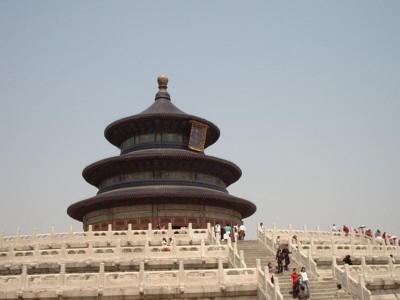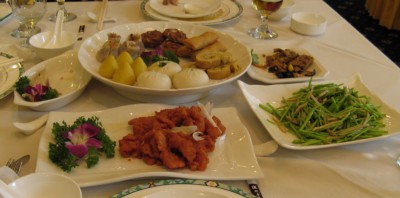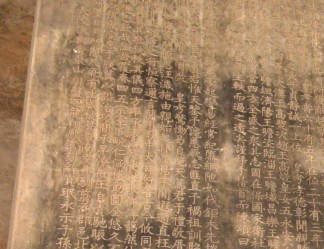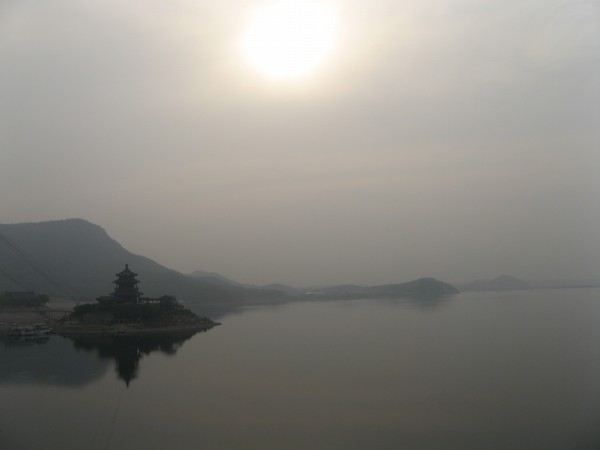A trip to Beijing
This week I am in Beijing to teach Topic Maps to the developers of a Chinese start-up company, which is developing a new product based on Topic Maps. I'll get back to the subject of the start-up and the training in a later posting. For now I'm so excited about being in China again that I'll confine myself to that subject. I was here for three weeks in 2004, and found myself absolutely fascinated, so I am more than happy to get another chance to visit.
History

Temple of Heaven, Beijing |
There are several reasons for this. One is the importance of China on the world scene. This country was the center of the world pretty much from civilization started until about 1600-1700. That may sound like an exaggeration, but this is easily the world's oldest living civilization, and for much of the world's history it had no competitors in terms of size, wealth, power, and technological sophistication. The Roman Empire came close for some centuries, but hardly anyone else. This is the country that invented noodles, the compass, gunpowder, rocketry, paper money, printing, ... The list is very, very long.
Today, China is fast on the way to regaining its former position. It's already the world's second biggest economy, and will according to current predictions bypass the US by 2020. Beijing these days is one huge maze of straight 6-lane highways with high-rises in between, and the number of high-rises under construction is unbelievable. It's not hard to see why China is the world's biggest consumer of steel, copper, and coal.

Skyscrapers being built, Shanghai |
Culture

Chinese meal |
Personally, I find Chinese culture equally interesting. Down here, even the format of meals is different. In the west you order one dish (and maybe a starter), and then eat it. Here, you order 5-6 dishes, plus rice, and they arrive one by one to be shared by the whole group. In addition, the dishes mostly defy western categorization, so getting a meal here can be a very confusing experience. What seems like a cake may be the main part of the meal, the nicely diced chicken may be full of bones, and quite often dishes fail utterly to conform to the expectation raised by their English description in the menu. Like I said, it's interesting.
Another aspect of the experience is being in a place where you can't read anything, nor can you pick up a single name or word. All over the world I can pronounce people's names more or less correctly, and when I say the name of some obscure city or province they know what I mean. This does not apply in China (or Vietnam). The reason is that the tone is part of the pronunciation, just as much as the consonants and vowels. So if you say san guo nobody has any idea what you mean, even though this is the Chinese title of "Three Kingdoms", an extremely famous ancient Chinese novel. Well, famous in China, anyway. You have to get the tones right when speaking Chinese, and most of the time this defeats me utterly.

Stele, Ming tombs, Beijing |
In fact, I find it easier to deal with the Chinese characters (which of course does not mean I find them easy to deal with). When trying to buy "Three Kingdoms" (in 2004) any attempt to say the title, in English or Chinese, first to the lady behind the counter, then to her colleague, and finally to three Chinese boys who were enlisted to help, were fruitless. I was on the verge of giving up when I decided to try to write the characters (三国), and before I had even finished the last character they all went "aaahhh! san guo!". Which is what I had said, but of course without the right tones. (The book is actually interesting enough to deserve a posting of its own. I'll write one if I get the time.)
The key problem with the tones for Norwegians (and English-speakers) is that we ask questions with a rising intonation. Any attempt to say something in Chinese will of course come out as a question (as in, "is this right?"), and so no matter that the right tone is, I'll wind up giving it a rising tone. And so it never works. I've been trying for a couple of days now to say rice ("mee fa"), and while I can imitate my host just after he says it, after a longer break I always get it wrong.
Having an interpreter
One thing that's different from when we were here in 2004 is that I'm now staying with the owner of the startup and his wife. So this time there is someone to explain all the things that puzzled me last time. (Ie: these poor people get subjected to a barrage of questions which they answer with impressive patience.) During Sunday lunch I finally got to learn a little about which types of dishes come from which Chinese provinces, and the stories behind some of the dishes. (One of them turned out to be invented by a farmer who fed one of the Ming Empresses when she fled from some rebellion or war. Having no food fit for an Empress, he invented a kind of simple cake made from corn. There's more to the story, but you get the idea.)
During the same lunch I ask about the style of calligraphy on the poster on the wall, and finally find out what the "grass" style of calligraphy is. It then transpires that the poster is actually a poem about Cao Cao, a character from Three Kingdoms. (This book is actually worth a posting of its own, to follow if I get the time.) This leads to a discussion of the characters in the book, the story, and so on.
I can only conclude that those who visit China without speaking Chinese miss more than anyone could guess. That's a sad fact of life, of course, but it's also part of the fascination. The challenge of trying to decipher a very, very different culture may well be what I like so much about this country.

Ming tombs reservoir, Beijing |
Similar posts
Three Kingdoms
Three Kingdoms is a Chinese "novel" written in the 12th century based on the events of the so-called "Warring States" period of Chinese history (that is, the 3rd century)
Read | 2006-08-21 00:05
Writing Japanese
If speaking and understanding Japanese seems difficult, that's nothing compared to reading and writing it
Read | 2007-07-31 21:53
Teaching Topic Maps in Beijing
As I wrote in an earlier posting I was in Beijing to teach Topic Maps to the developers of a Chinese start-up
Read | 2006-08-20 23:51
Comments
Liangbing Zhu - 2006-05-29 07:51:36
Welcome to China!I'm glad you like the culture and food of China.Waiting your introduction about the particular of this time training,and I want to know which company is develop a product based on Topic Maps in China. Have a good trip!
Lars Marius - 2006-05-30 10:55:51
Thank you! I'm in Seoul now, but I really enjoyed the trip. I'll do my best to write more about the training. I'll send you information about the company by email.